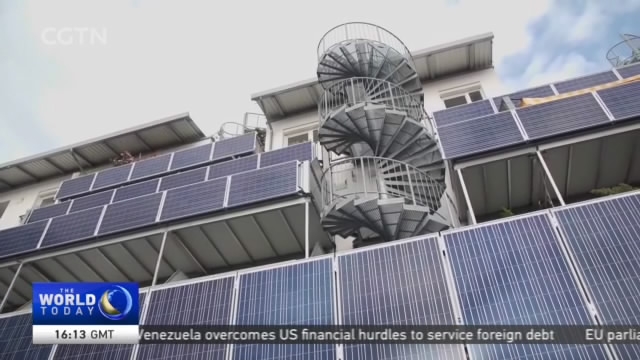
11:22, 16-Nov-2017
Bonn COP23: German city of Freiburg leading the way on green energy

Nearly a third of Germany's electricity comes from renewable resources. The country is determined to cut CO2 emissions and close all of its 17 nuclear plants by 2022. One of the German cities leading the way is Freiburg. CGTN's Natalie Carney has the story.
Freiburg, Germany, prides itself on its green image. Every aspect of living here is environmentally thought through. Electric transportation, 400 kilometers of bike paths, balconies lined with solar panels and an eco-conscious society all contribute to helping the city reduce its energy consumption and in some cases, produce more than it consumes. Even walls are painted with special paint that can break down nitrogen oxides in the air and release fresh oxygen. Wolfgang Frey and his family have been at the forefront of this renewable revolution. He heads one of the city's most progressive eco-conscious architectural firms with many projects across China.
WOLFGANG FREY ARCHITECT AND CHAIRMAN OF FREY GROUP "For me, there are three issues connected to this passive house idea. The first is you've got to make sure the buildings are well insulated. Second, the very low amount of energy buildings need should be provided by itself. The third situation, make clear people understand. If people are involved they get eager to handle this energy use in a smart way."
Frey Architecture's "wooden house" is about as "passive" as they come. This structure produces only seven kilowatts per hour of energy per square meter. To put that into perspective, the human body, at rest, produces five kilowatts per hour.
NATALIE CARNEY FREIBURG "Sustainability is literally built into the city's foundation: architectural standards here are even stricter than Germany's national standards. Yet, while Freiburg may be on the cutting edge of the renewable revolution, there is much more work that needs to be done.”
PROF. DR. HANS-MARTIN HENNING DIRECTOR OF FRAUNHOFER ISE "It's completely different to our present and past energy world, where we have power generation when we need it."
While the German government offers subsides to reduce initial renewable infrastructural costs and encourages green living, it cannot control the weather. Hans-Martin Henning is the director of Europe's largest solar research and development institute.
PROF. DR. HANS-MARTIN HENNING DIRECTOR OF FRAUNHOFER ISE "Solar and also wind energy are fluctuating and they cannot be planned. We need storage to overcome that. There is already industry existing particularly in Asia, who are producing batteries, but what we need is to really bring costs further down but also to make sustainable battery systems."
Henning says one of the keys is energy efficiency, especially if Germany wants to meet its ambitious target of reducing its greenhouse gas emissions by 80% over the next three decades.
PROF. DR. HANS-MARTIN HENNING DIRECTOR OF FRAUNHOFER ISE "It's not just enough to replace conventional energy, fossil energy by renewables but also make very efficient use of these energies."
That includes more accessibility to high wattage batteries and the conversion of excess energy into hydrogen. Until then…
PROF. DR. HANS-MARTIN HENNING DIRECTOR OF FRAUNHOFER ISE "We will still need fossil to bridge the time until we have a fully renewable system."
This becomes even more important for countries dependent on others for natural gas and further fuels the need for self-reliant and sustaining energy sources. Natalie Carney, CGTN, Freiburg, Germany.

SITEMAP
Copyright © 2018 CGTN. Beijing ICP prepared NO.16065310-3
Copyright © 2018 CGTN. Beijing ICP prepared NO.16065310-3